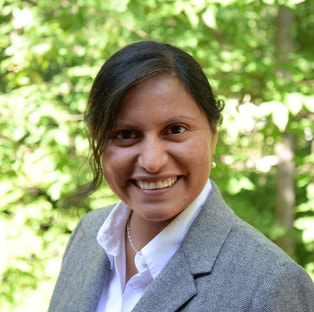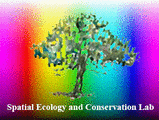Faculty Directors
|
Angelica M. Almeyda Zambrano, PhD, is Research Faculty in the Center for Latin American Studies at the University of Florida. Where she is a Core Faculty of the Tropical Conservation and Development program. She is also affiliate faculty at the biodiversity and water institutes at UF. She co-directs the GatorEye Unpiloted Flying Laboratory and directs and manages the new GatorEye XL partnership. She holds a PhD in Anthropology from Stanford University, a MS in Latin American studies from the University of Florida, and a BS in Forestry from the Universidad Nacional Agraria La Molina in Lima, Peru. In her free time, she enjoys walks in nature, photography, and fiction books.
|
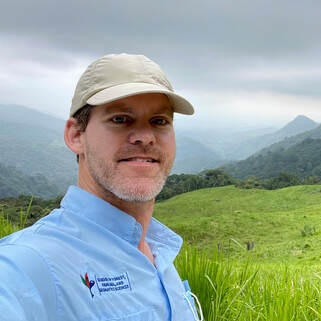
Eben N. Broadbent is an Associate Professor of forest ecology and geomatics in the School of Forest, Fisheries, and Geomatics Sciences at the University of Florida where he co-directs the Spatial Ecology and Conservation Lab and the GatorEye Unmanned Flying Laboratory, a leading academic-commercial partnership drone-borne sensor-fusion system. He holds a PhD in Biology from Stanford University, a MS in Tropical Forestry from the University of Florida, and a BA in Botany from the University of Vermont. He is a faculty affiliate of UF's Tropical Conservation and Development program, Center for Latin American Studies, Water Institute, and Biodiversity Institute. His research spans spatial scales from the globe to the leaf, and integrates multi-temporal analysis to look at how fast changes are occurring across the landscape. For this he frequently integrates a variety of remote sensing approaches, including those borne on satellites, aircraft, drones, or in the field. A few example projects include, at the global scale, the GeoPlot system for monitoring bioclimatic and land-use change around global plot networks, focusing on his role in the 2ndFOR network to understand forest successional processes in the tropics; the GAP dataset which calculates Global Aboveground biomass uptake Potential at a global scale; at the regional scale, the STORM CLOUD system which uses satellite-borne radar data to monitor hurricane forest damages in near real-time, a collaboration with USFS and FIA; the development of long-term network of forest disturbance monitoring plots through the BigPlot network; and at the stand-scale, the development of new long-term stem-level monitoring plots in Florida, specifically leading the San Felasco permanent ecological monitoring plot, a close long-term collaboration with Florida Park Officials and Ecologists. Over the last years he has conducted field-research in more than 14 countries, including Brazilian, Bolivian, and Peruvian Amazon, Papua Indonesia, Hawaii, Costa Rica, Philippines, and Mexico, and also including work in California and in his childhood forests of New England. His collaborative projects often blend social sciences with ecological and remote sensing methods, providing comprehensive insights into ecosystem processes and conservation strategies. He has worked as a research ecologist in the Department of Global Ecology of the Carnegie Institution for Science at Stanford University, at the Instituto Boliviano de Investigación Forestal in Santa Cruz, Bolivia, and at Hudsonia Ltd. at Bard College. His favorite activity is spending time with his family, including his kids Liana and Kai, and his dogs Turbo and Inti Duce. When time allows, he enjoys mountain biking, trail running, snowboarding, guitar, and playing chess.
| broadbent_cv_021623_v2.pdf | |
| File Size: | 561 kb |
| File Type: | |
Research Scientists / Post Doctoral
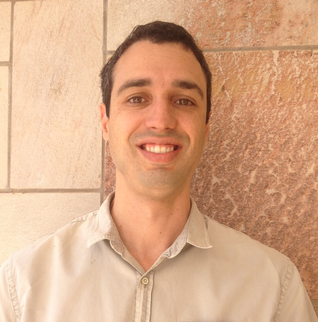
Gabriel Prata, PhD, is a post-doctoral associate / Research Scientist in the SPEC Lab. He is a forest engineer, and received his bachelor's, master's and PhD all in Forestry and at University of Sao Paulo, ESALQ in Brazil. He works with remote sensing, more precisely with the GatorEye (LiDAR, Hyperspectral, multispectral, and visual data) and its fusion with other sensors like Satellite and different sources of LiDAR data. His main project is focused on forest damages and recovery after Hurricane Michael in the north of Florida State in 2018, in a partnership with the US Forest Service and Florida Agricultural and Mechanical University (FAMU).
CV
CV
Graduate Students - PhD
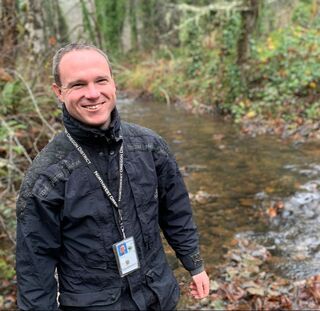
Jesse Scott, is PhD student, and previously completed an online masters, in the School of Forest Resources and Conservation with a concentration in Ecological Restoration, and an additional Graduate Certificate in Natural Resources Policy and Administration. He is advised by Dr. Eben Broadbent. He received his Bachelor of Applied Science from St. Petersburg College in Sustainability Management. Jesse is employed by the U.S. Army Corps of Engineers, St. Paul District, in Minnesota as a Hydrologist and GIS Specialist where he combines his professional background in environmental and hydrological sciences towards various water management, ecology and water quality research, river and reservoir regulation, and emergency operations for the entire Upper Mississippi Watershed Basin. Jesse is pursuing a publication in collaboration with Dr. Broadbent to better understand the hydrological dynamics and disturbance regimes that promote preservation of early successional riparian plant biodiversity suitable for threatened butterfly species. When he is not studying, Jesse can be glimpsed fly-fishing or paddling only by remote imagery deep in the wilderness. Jesse has concurrently pursued a career senior military officer track in addition to his passion for eco-hydrology.
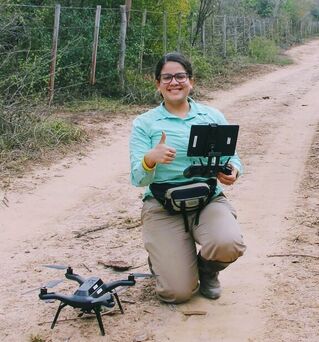
Susana Ruiz Diaz is a PhD student in the School of Forest Resources and Conservation at the University of Florida. For her MS, she was advised by Dr. Eben Broadbent, who now serves on her PhD committee in the School. She is from Paraguay and graduated from the Forest Engineering Program – Universidad Nacional de Asuncion, she came to the UF through a Fulbright scholarship. She is broadly interested in Forest Ecology in Tropical forests, phenology, its relationship with biotic and abiotic factors and the use of remote sensing methods. She has experience working in the Cerrado and Dry Chaco in Paraguay.
CV
CV
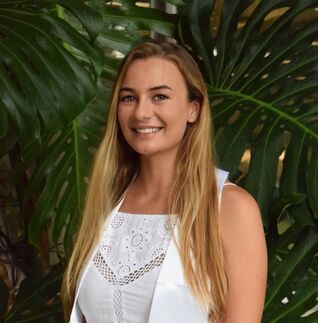
Emily Wheeler is a student in Interdisciplinary Ecology with a concentration in Tropical Conservation and Development (TCD) in the School of Natural Resources and Environment at the University of Florida. She is co-advised by Dr. Angelica Almeyda Zambrano and Dr. Tom Frazer. She received her Bachelor of Science in Ecosystem Science and Policy, Biology, and Marine Science with a certificate in sustainability from the University of Miami. She is the recipient of the National Science Foundation’s Graduate Research Fellowship Program (GRFP) and is interested in analyzing social-ecological systems in the Galapagos Islands. She is combining her natural science background with the social sciences to create a multidisciplinary study for her dissertation. She is currently investigating the applications and perceptions of ecotourism, with the hopes of benefiting both local populations and conservation efforts.
CV
CV
Graduate Students - MS
Research Associates
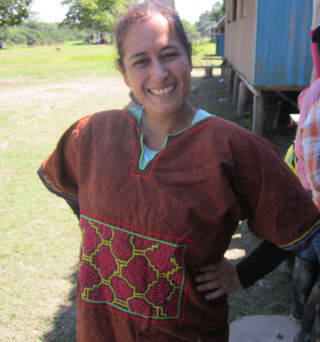
Andrea B. Chavez, PhD, is an Research Associate in the SPEC Lab. Her main projects are (a) infrastructure and governance issues in the Peruvian, Colombian and Brazilian Amazon, and (b) phenological mismatches among migratory birds and forest productivity using automated 4D soundscapes and coordinating a team of artificial intelligence programmers to develop a new R package titled 'SoundMapper4D'. She co-leads the Governance and Infrastructure in the Amazon (GIA) project to improve transparency and accountability of infrastructure planning for good governance of protected areas mosaics with the Center for Latin American Studies and the Tropical Conservation and Development Program at the University of Florida. These activities have included participatory mapping and drone capacity training. She received her doctorate in Geography from the University of Florida and received a master’s degree in Political Science from Karl-Ruprechts-Universität in Heidelberg, Germany and master’s degree in Geography from the University of Miami, Fl. She has field research experience in the forests of Cusco, Madre de Dios, Ucayali in Peru, Acre, Brazil, and Pando, Bolivia.
CV
LATAM Profile
CV
LATAM Profile
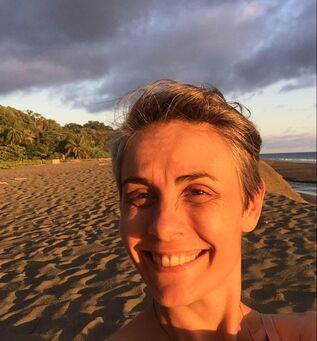
Beatriz Lopez Gutierrez completed her PhD candidate in the School of Forest Resources and Conservation at the University of Florida. She was advised by Dr. Broadbent. Bea graduated with an Honors Degree in Zoology at Cambridge in 2009 and completed a Master Research in Biosystematics at the Imperial College London, UK, in 2011. In addition to her academic life, she has been involved in various conservation projects around the world; both in Spain where Beatriz was born and raised and in South East Asia where she first developed a real interest in tropical conservation, community development, and environmental education. More than 15 years after her first experience in the field, having worked and led a wide range of marine and terrestrial investigations and projects across the world, Beatriz is currently dedicating her efforts to the study of biodiversity, sustainability, conservation and development issues in tropical regions, particularly in the Osa Peninsula and Golfito region, Costa Rica. Her PhD research develops a multidisciplinary system, combining remote sensing procedures, rapid assessments of bioindicator species, and social surveys, designed to evaluate, monitor, and manage human impacts on biodiversity, outside of public protected areas. This system focuses on nature-based tourism in the Osa Peninsula, but it has extended applications for other sustainable activities happening in anthropogenic tropical landscapes.
CV
CV
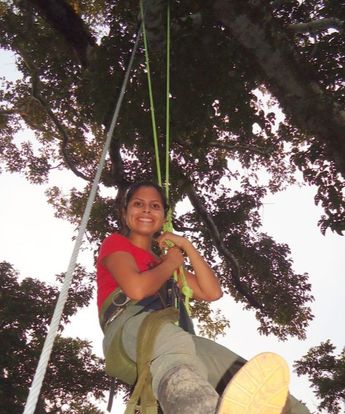
Sandra L. Almeyda Zambrano holds a BS degree and forest engineering certification from “Universidad Nacional Agraria La Molina”. She is a Masters student alumni with the SPEC Lab, advised by Eben Broadbent, in the Department of Geography at the University of Alabama, Tuscaloosa. Her MS thesis studied forest structural determinants of primate movement patterns in the Peruvian Andes. She is now the manager at AmaZOOnico Rescue Center for Wildlife in the Ecuadorian Amazon.
Please see her personal site at: http://www.peruconservation.org/sandra
Please see her personal site at: http://www.peruconservation.org/sandra
Alumni
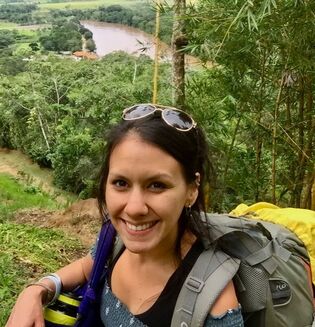
Carla Mere Roncal is a PhD student in the School of Forest Resources and Conservation at the University of Florida. She is advised by Dr. Broadbent. She obtained a Bachelors degree in Biology in her home country, Peru, from the Universidad Peruana Cayetano Heredia, and a Masters degree from George Mason University in Virginia, USA. Carla's research focuses on determining mechanisms that facilitate species coexistence of similar species and what drives high diversity patterns in the Amazon. Her research leverages on the application of new tools (i.e. camera traps, acoustic recorders, drones, remote sensing, occupancy modeling, citizen science data) to increase the understanding of closely related and understudied ground-dwelling bird (tinamous) in tropical rainforests.
CV
CV
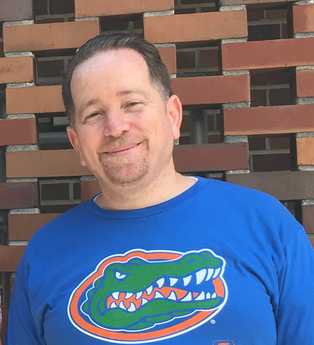
Youssef Kaddoura is a PhD student and Research Scientist in the Geomatics Program at University of Florida. He is advised by Dr. Benjamin Wilkinson and Dr. Eben Broadbent. His doctoral research investigates establishing a reproducible methodology to georeference PhenoCam images towards advancing the precision to the second level taking it from Region of Interest (ROI) level to Pixel level. He takes a multidisciplinary approach that encompasses the fields of photogrammetry, ecology, lidar, and conventional surveying techniques and theories. He is involved in the ASPRS Student Advisory Council and recently became Deputy Communication Councilor. He holds a master’s degree in Computer Information Science and Engineering (CISE) from the University of Florida, that investigated cost effective indoor positioning systems for smart spaces. Previously, Youssef worked at Geospatial Consultancy Company that is an ESRI partner in Dubai focusing on integrating innovative geospatial applications and empowering senior executives at the governmental entities with easy to use geospatial decision-making tools.
CV
CV
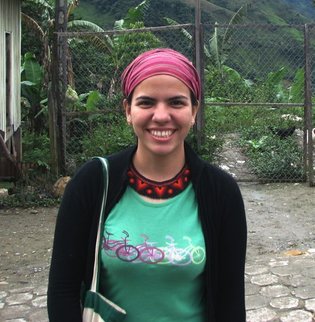
Pamela Montero-Alvarez, is a PhD student in the Department of Tourism, Hospitality and Event Management at the University of Florida, with a concentration in Tropical Conservation and Development. She is co-advised by Dr. Almeyda Zambrano. Pamela obtained her bachelor’s degree on Biological Science at the National University of the Peruvian Amazon (UNAP); and her Graduate Diploma on High Amazonian Studies from The Pontifical Catholic University of Peru (PUCP). Her professional experience includes service as Specialist on Protected Areas for the “Peru Bosques” – USAID/Peru Project; and Specialist on conservation and ecotourism for the National Bureau of Forestry and Wildlife, Ministry of Agriculture. Pamela conducted the project: "Developing Communal Monitoring Strategies through Community-Based Tourism in the Peruvian Amazon", funded by the Rufford Foundation. She is currently part of the Governance and Infrastructure in the Amazon – GIA Project. For her dissertation research, Pamela investigates the relationship between tourism and conservation via analysis of social capital and networks and conceptual approaches on community-based tourism.
CV
CV
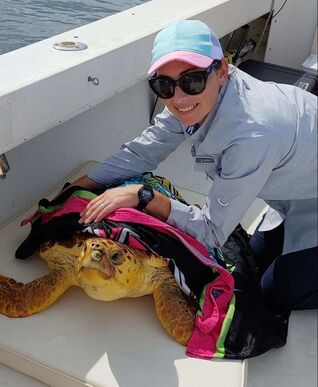
Danielle Clooney is GIS analyst in Tampa, Florida. She has a bachelor’s degree in Environmental Science and later obtained her GIS Certificate in 2018. She is currently enrolled in the Master of Science Program with a concentration in Ecological Restoration. Her time as an Environmental Scientist working for a private consulting firm allowed her the opportunity to conduct terrestrial and marine endangered wildlife surveys as well as invasive species removal, wetland delineations and planted wetland creation areas . Her academic interests are based off combining her UAV piloting skills, GIS expertise, and interest in coastal and marine restoration.
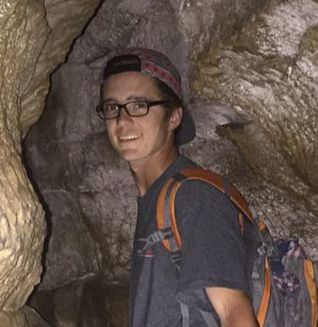
David Huggins is a M.S. Student in the School of Forest Resources and Conservation at the University of Florida and is advised by Dr. Eben Broadbent. David has a Bachelor’s Degree in Geology from Albion College, and a Master’s Degree in Geospatial Science and Environmental Geology from Missouri State University. His graduate research was on the spatial distribution of heavy metal contamination in fluvial environments at a USEPA Superfund site in S.E. Missouri. During graduate school, David has worked on numerous other habitat assessment and water quality projects including erosional beach surveys at the Galleon Fish Sanctuary in Jamaica, and the impact of wildfires on water quality and fluvial geomorphology in the Mark Twain National Forest in Missouri. Currently, David is employed with the Florida Department of Environmental Protection in Tallahassee where his work is primarily focused on springs and ground water restoration, as well as the development of Total Maximum Daily Load reports and Basin Management Action Plans. David’s research interests are in fluvial geomorphology, habitat assessment, spatial statistical analysis, and water quality.
Gary C. Baine II, is an online masters student in the School of Forest Resources and Conservation with a concentration of Geomatics. He is advised by Dr. Eben Broadbent. Gary received his bachelor degree in marine biology from Texas A&M University in Galveston, Texas and a masters in biology from the University of West Florida. His masters thesis was on the effects of nutrient inputs on primary productivity in the Grand Bay estuary in Mississippi. His interests lie in spatial ecology, ecological modeling, and the pathways of nutrient flows throughout an ecosystem. Currently Gary works for the Florida Department of Environmental Protection as an Environmental Specialist investigating violations regarding Florida’s natural resources. During his free time, Gary dabbles in electronic music production, PC gaming, custom PC building, and Brazilian Jiu Jitsu.
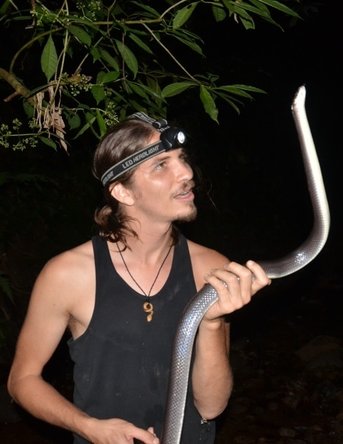
Andrés Jiménez Monge is a biologist with a deep passion towards herpetology, a keen eye for photography and a strategic vision for problem solving. Andres started working on conservation and environmental management when he was fifteen years old, with his effort in the field award him as Emerging Wildlife Conservation Leader by the International Found for Animal Welfare and the United States Wildlife and Fisheries Service. He has taken an active role in political advocacy on the country towards the improvement and refurbishing of the Costa Rican fisheries management, shark fining regulations and the involvement of Costa Rica on the International Whaling Commission. As Wetland program manager for Osa Conservation he worked along with the SPEC Lab on the assessment of land use change in the Térraba Sierpe National Wetland. In this project he directed the implementation of business strategies for local communities focused on sustainable management of mollusk and the implementation of the protected area management plan. He strives towards improving the way environmental management implements environmental solutions; his passion for environmental problem solving has directed his work to strategy, business development, project management theory and change management in environmental transformation projects. His research wants to help redefine how humans relate with wildlife, focusing on well being and saving “the ordinary”. He can be contacted via email at: andresjmo (-at-) gmail.com. His personal photo blog is available at: www.razaverde.com
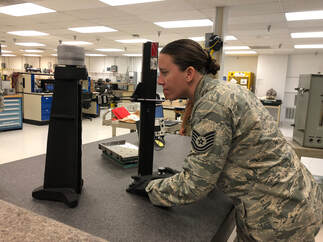
Sarah Cartmill is a distance student in the MS in Forest Resources and Conservation program, with a concentration in Ecological Restoration. She received her undergraduate degree in History from the University of Mount Olive in North Carolina. Currently, she works for the United States Air Force as a Quality Manager Meteorologist, specializing in quality control of world-wide and regional support for calibration equipment. During her free time, she enjoys traveling, camping and riding motorcycles.
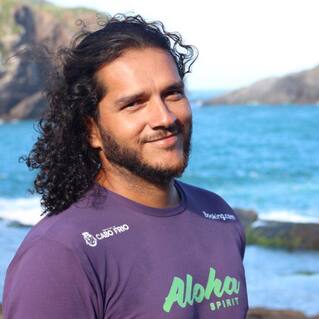
Igor Vianna Sousa is a MA student at the Center for Latin American Studies at the University of Florida advised by Dr. Almeyda Zambrano. His goal is to understand how traditional communities living in sustainable-use protected areas work with tourism activities in their territories, in order to discover if tourism is a financially, environmentally and socially positive activity and to what extent it promotes local empowerment, autonomy, and strengthening of local identity/culture. He conducts research at two protected areas located in the Brazilian Amazon: Tapajós National Forest and Extractive Reserve Tapajós-Arapiuns. Both areas have been experiencing an intense growth of tourism in the past years. In addition, the region where they are located has been pressured by various environmental threats such as deforestation, cattle, mining, and hydroelectric dams.
CV
CV
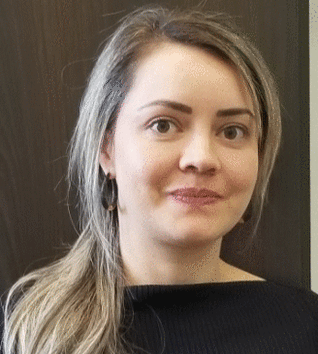
Ana Paula Dalla Corte, PhD, is a full professor at the Department of Forest Science at the Federal University of Parana (Public National University), working in the fields of Forest Management, Forest Inventory, Remote Sensing and Photogrammetry (since 2011). She is a visiting professor in the School of Forest Resources and Conservation at the University of Florida. Her activities during her time at the SPEC lab include collaborating on investigations to use GatorEye data (LiDAR, Hyperspectral, multispectral, and visual data) to generate estimates of biomass and other stand parameters using data recently collected in Brazil with a focus on forest plantations. She works closely with Dr. Eben Broadbent and Dr. Angelica Almeyda Zambrano.
CV
CV
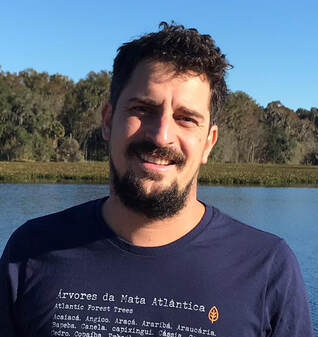
Danilo R. Alves de Almeida, PhD, research focuses on forest ecology, management and restoration using remote sensing technologies. Currently he has a joint post-doctoral position in the Department of Forest Resources at the University of São Paulo (Brazil) and at the School of Forest Resources and Conservation at the University of Florida. Danilo obtained his Ph.D. in Forest Resources from the University of São Paulo, 2019; his M.S. in Tropical Forest, from the National Institute of Amazonian Research, 2015; and his B.S. in Forest Engineering, from the Federal University of Viçosa, 2012. His main current project is focused in monitoring forest landscape restoration from unmanned aerial vehicles using lidar and hyperspectral remote sensing.
CV
CV
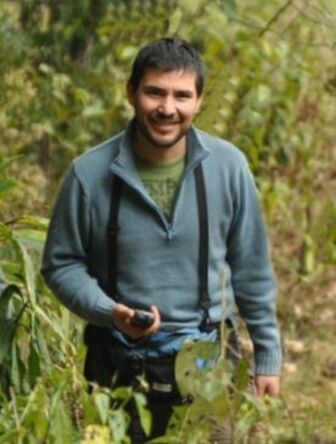
Carlos Alberto Quispe Gil is a Biologist educated at the National University San Antonio Abad in Cusco, Perú. He is an affiliated researcher with the SPEC Lab and served as the scientific coordinator at the Amazon Conservation Association Los Amigos field station in the Peruvian Amazon. He is led the field work of the SPEC Lab - Amazon Conservation collaborative project monitoring the terrestrial biodiversity at the Los Amigos biological station using camera traps and animal track monitoring, linked with satellite, airplane, and unmanned aerial vehicle (UAV) based remote sensing. His core interest is to contribute to biodiversity conservation in Peru, and since 2007 he has collaborated on conservation projects with government, non profits and private institutions. Please see his personal webpage at: http://www.peruconservation.org/carlosalberto
Margaret Songster graduated with a BS in Ecology from the University of Georgia. She is working with the SPEC Lab as a research assistant based at Lapa Rios Ecolodge on the Osa Peninsula of Costa Rica, where she is involved in a variety of upcoming projects which may range from ecotourism surveys, and community capacity building and outreach efforts, to soil fertility linkages with endemic tree species, and integrated biodiversity monitoring using semi-automated bird, bat, and terrestrial mammal sensors.
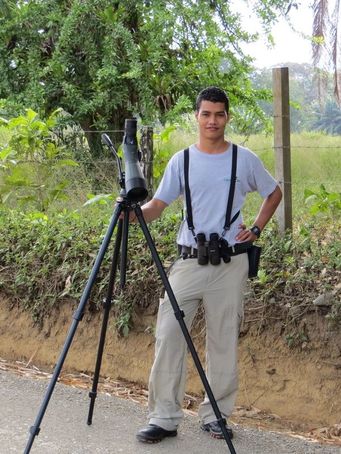
Guillermo Mulder is a Costa Rican conservation biologist and ecologist with great experience in the fauna and flora of the Osa Peninsula and region. He was the guides leader, and is now director of sustainability, at the Lapa Rios Ecolodge on the Osa Peninsula of Costa Rica. He is also leading the field work of the SPEC Lab - Lapa Rios camera trap project. Please see www.laparios.com or www.blog2.laparios.com for more information on this lodge and the surrounding area.
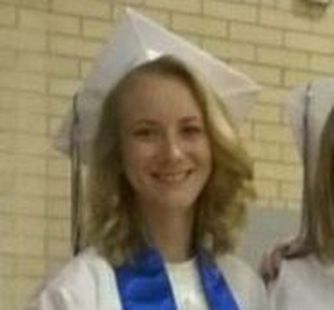
Clare Ols graduated with a BS in Biology from the University of Alabama. She is a native of Cleveland, OH. She is working with the SPEC Lab originally through the University of Alabama Emerging Scholars Program ( http://emergingscholars.ua.edu ) and now continues wrapping up various projects for publication. For her research, she has spent months living in remote areas of Costa Rica leading camera trapping projects to identify linkages between animal species composition and abundance distribution and drone-derived forest structural attributes in the Osa Verde ecological farm owned and managed by Osa Conservation. She is also involved in other projects linking forest structure and wildlife in the Lapa Rios ecolodge nature reserve in Costa Rica. She currently is based at Lapa Rios Ecolodge in Costa Rica, where she is leading up projects on citizen science, soundscapes, and camera traps in private nature reserves, prior to starting law school end of summer 2019.
Eduardo Schmitz Bongiolo is conducting a research internship in the SPEC Lab using remote sensing to map Brazil Nut tree density in Acre, Brazil, through integration of a network of field plots he established for his MS work and recent high-resolution Planet Labs and Sentinel-2 satellite imagery. He is from Brazil.
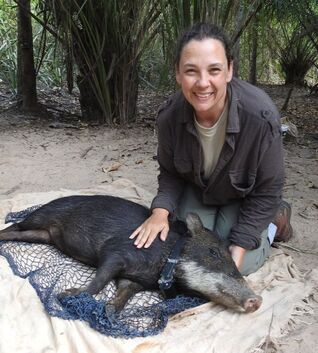
Trina Merrick, PhD, is a Provost’s Postdoctoral Fellow at Florida State University working with Dr. Stephanie Pau and a Courtesy Research Assistant Scientist with the SPEC Lab at the University of Florida. She uses remote sensing to quantitatively address environmental and ecological questions. Her research revolves around applying physics principles to study interactions between the terrestrial biosphere and atmosphere, i.e. the field of environmental physics. She uses data from ground, tower, UAV, and satellite sensors to understand phenomena occurring between organisms and their environment, such as relating spectroscopy measurements of plant function to measurements of productivityin the tropics. She works extensively in the Atlantic Forest, Cerrado and Pantanal regions of Brazil, and on Barro Colorado Island, Panama. Trina mentors undergraduate and graduate researchers across disciplines, including Computer Science and International Affairs, leveraging techniques such as deep learning, signal processing, and geospatial analysis. She also teaches workshops on effective instruction practices for graduate teaching assistants.
CV
CV
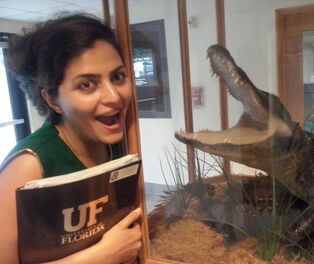
Hoda Manafian completed her PhD student in the Department of Tourism, Recreation and Sport Management at the University of Florida. She was advised by Dr. Almeyda Zambrano. She is broadly interested in using a geospatial approach to assess dynamics of agritourism in Florida. This approaches integrates Florida's largest economic sectors, tourism and agriculture to identify 'win-win' approaches to resilient sustainable industries. In addition to potential economic advantages, agritourism development may be an effective tool for sustainable conservation of "agricultural heritage", which is the main source of cultural ecosystem services (CES) in agricultural context. Her current research project seeks to assess, map and quantify the social values of CES of agritourism farms in FL through analyses incorporating geographic information systems (GIS) and the SolVES modeling framework. She is from Iran, where her studies were on sustainability science topics related to rural development. For her master's thesis she worked on sustainable rural tourism as a "cultural heritage preservation" strategy in an ancient national heritage site called Abyaneh Village, which has more than 1500 years of cultural history, which is located in her hometown Isfahan. She holds a minor in Historic Preservation from UF.
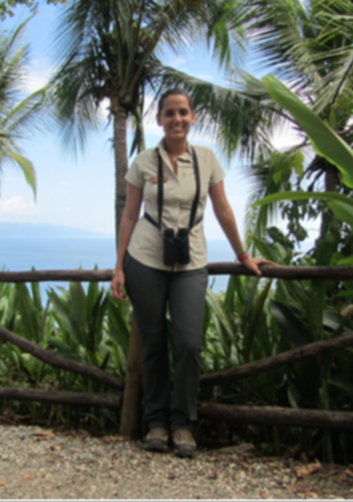
Valerie Valdelomar León is a Costa Rican conservation biologist and ecologist with great experience in the fauna and flora of the Osa Peninsula and region. She is a guide at the Lapa Rios Ecolodge on the Osa Peninsula of Costa Rica. She worked on the SPEC Lab - Lapa Rios camera trap network.
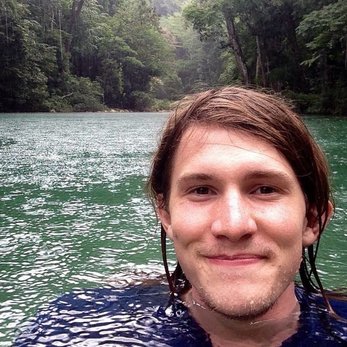
Philip Shimel is an undergraduate from Colorado, majoring in Environmental Science. He will be working with the SPEC Lab through the University of Alabama Honors College. He completed an REU internship researching pollination at the University of Virginia's Mountain Lake Biological Station (See "Shimel, Philip" http://mlbs.org/2014REUProjects). He has field experience catching amphibians with UA's Rissler Lab, surveying cloud forest in Ecuador (See https://ecomingafoundation.wordpress.com/2014/12/21/two-new-magnolia-species-discovered-in-our-rio-zunac-reserve/), and traversing rainforest in Belize to help study jaguar conservation with SPEC Lab alumnus Michael Dobbins. Starting Fall Semester Philip will be working on landscape – pollinator interactions in Alabama forests, specifically Lake Lurleen State Park. A recent copy of his resume is available for download at download.
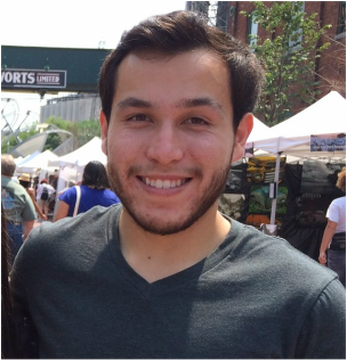
Austin Pinkerton is an undergraduate majoring in Computer Science from Madison, Mississippi. He is working with the SPEC Lab through the University of Alabama’s Computer-based Honors Research Program ( http://honors.ua.edu/computer-based-honors-program ). For his project, which started Spring 2015, Austin will be working with Dr. Broadbent on the design, programming, field validation and parameterization, and implementation of an automated pattern recognition algorithm to identify individual tree-crown dimensions and related forest structural and compositional attributes from high spatial resolution visual and multi-spectral sensors acquired from unmanned aerial vehicles (UAVs). Specifically, the project will focus on using IDL as the primary programming language on Micasense multispectral and visual (RGB) imagery collected from the PrecisionHawk UAV platform (www.precisionhawk.com) and post-processed in Pix4DPro software (www.pix4d.com) which uses photogrammetric correlation analyses to produce 3D point clouds, digital surface and elevation models, and ortho-mosaics at spatial resolutions as high as 1 cm2. This project is a collaboration with both PrecisionHawk and their subsidiary web based imagery analysis platform www.datamapper.com.
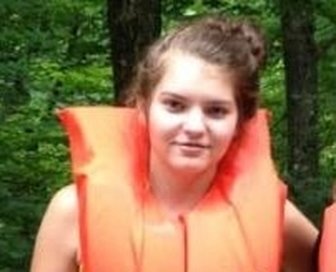
Katy Shay is an undergraduate majoring in Environmental Science. She has been working with the SPEC Lab through the University of Alabama Emerging Scholars Program. Katy led the Arboretum Soundscape Program (arboretum.ua.edu) monitoring seasonal changes in avifauna composition and abundance as well as a project comparing phylogenetic vs. ecological factors defining avian song similarity.
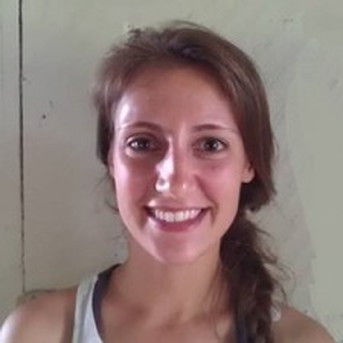
Cindy Taylor graduated with a B.S. in biology from Ursinus College in Pennsylvania. She worked for two and a half years as a lab technician at the University of Pennsylvania, studying the epigenetic mechanisms contributing to neuropsychiatric disease. She then spent one year in Costa Rica studying the foraging behavior of capuchin monkeys. For her thesis, she examined the spatial and temporal determinants of the composition and abundance of bat species within the Oakmulgee Ranger District of Talladega National Forest.
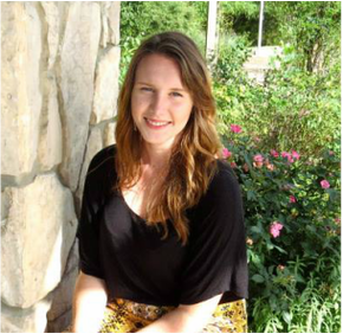
Kelsi Davis is a researcher and graduate teaching assistant in the Department of Geography at the University of Alabama. She is attending as a master’s student under the advisory of Dr. Eben Broadbent within the Spatial Ecology and Conservation (SPEC) lab. Kelsi attended Texas A&M University, where she received her Bachelor of Science in Environmental Geosciences with a minor in Geography. While attending Texas A&M, she worked on a wide variety of research and projects. In 2012, she served an assistanceship with the USGS to analyze water quality in the region of San Antonio, Texas. In 2013, she attended a study abroad trip where she focused heavily on the effects of ecotourism in both Costa Rica and Nicaragua, and variation of microclimates within a tropical cloud forest in Costa Rica. In her last two years of earning her undergraduate degree, she worked under the advisory of Dr. Daniel Goldberg and in collaboration with the Audubon Society to analyze Volunteered Geographic Information and its capabilities of serving as accurate scientific research data. Kelsi also assisted Dr. Brendan Roark with lab work concerning collecting the isotopic signatures of chemosynthetic mussels from the Atlantic Ocean. Kelsi’s current research interests pertain to secondary forest biomass accumulation spatio-temporal patterns and drone-borne LiDAR monitoring. She is also interested as to how the depletion and deforestation of tropical forests will affect global climate change.
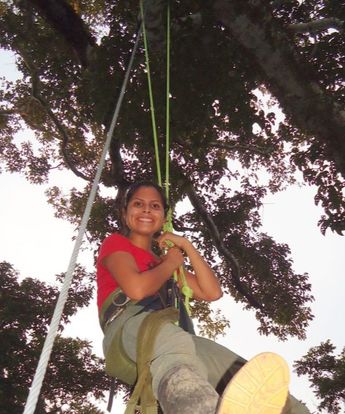
Sandra L. Almeyda Zambrano holds a BS degree and forest engineering certification from “Universidad Nacional Agraria La Molina”. She is a Masters student alumni with the SPEC Lab, advised by Eben Broadbent, in the Department of Geography at the University of Alabama, Tuscaloosa. Her MS thesis studied forest structural determinants of primate movement patterns in the Peruvian Andes. She is now the manager at AmaZOOnico Rescue Center for Wildlife in the Ecuadorian Amazon.
Please see her personal site at: http://www.peruconservation.org/sandra
Please see her personal site at: http://www.peruconservation.org/sandra
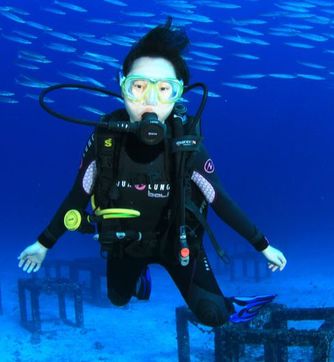
Zhiqing “Gail” Cheng, is an undergraduate student majoring in Tourism, Events and Recreation Management and minoring in Geography in University of Florida. She is specialization in Tourism and Hospitality management. She currently conducts research on tourism in the Osa Peninsula, Costa Rica, under the guidance of Dr. Almeyda Zambrano. Her research includes the stablishment of a database on lodging offerings in the Peninsula and golfito area and the spatial analysis of lodging in the Peninsula. Gail hopes to gain more experience and pursuit further education in tourism after graduating from University of Florida. In her leisure time, she enjoys outdoor recreation and holds several certifications in scuba diving.
Oscar Ivan Raigosa Garcia is a MS student in the School of Forest Resources and Conservation at the University of Florida. He is co-advised by Dr. Broadbent and Dr. Minogue. He is originally from Colombia. His focus is on use of GatorEye LiDAR for forest tree level automated parameter extraction in Florida.
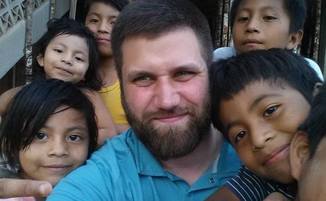
Michael T. Dobbins is a PhD student in the School of Natural Resources and Ecology at the University of Florida. Dr. Broadbent is his advisor. He was a Masters student and Graduate Teaching Assistant affiliated with the SPEC Lab at the University of Alabama. His MS research focused on a multi-faceted jaguar conservation project in the Mayan village of Blue Creek, Belize. Through the use of camera traps and track plotting, he investigated jaguar habitat selection and activity patterns over a 25 sq. mile study area centered around the village. Additionally, he interviewed residents of Blue Creek to obtain a better understanding of the human-jaguar interactions that take place, as well as to find out the overall attitude of the residents towards jaguars. His PhD research looked at the spatial ecology of terrestrial wildlife in dynamic human dominanted landscapes, and included bayesian occupancy modeling techniques, remote sensing, soundscapes for hunting intensity quantification, and surveys with diverse local communities.
